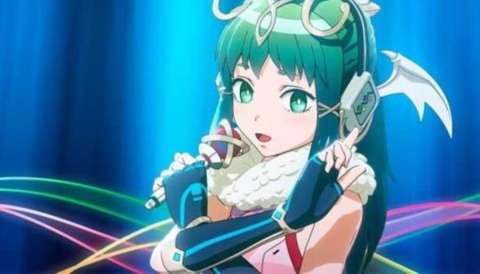At first glance, the candy-colored world of Tokyo Mirage Sessions #FE looks more like a artful mess than a coherent game. But as we've found, the mix of sensibilities and elements from Atlus' Shin Megami Tensei and Persona series with the weapons, skill systems, and well-known characters of Fire Emblem series works quite well.
Prior to the game's launch, we got a chance to throw a few questions the way of #FE's team. Both Atlus producer Shinjiro Takata and Nintendo designer Hitoshi Yamagami were frank in their explanation of why Atlus handled the text translation rather than Nintendo's Treehouse division, and in their defense of why certain elements get localized and changed for different regions.
GameSpot: Tokyo Mirage Sessions has an upbeat tone, in stark contrast to the core games of Shin Megami Tensei games. What is the background that made you go in a completely opposite direction?

Shinjiro Takata: We had hitherto mostly described stark, unusual situations, so we first of all wanted to base this around the drama of the character's growth that can only be depicted in everyday surroundings. We hit upon the idea of Japan's entertainment industry as a backdrop to achieve this goal, and we decided to describe a character that has a bright, positive outlook on life. We thus aimed for bright and colorful expressions, and that is probably why you feel that it has a cheerful atmosphere. Thanks to that, we were able to enjoy developing the game with a fresh feeling.
The game contains elements of both SMT and Fire Emblem. Do you think this will help bridge the fandom between players who have tried one series and not the other?
Takata: Of course, that is what we hope for. After playing this game, it will probably be natural for the fans to play the other series that they have not yet played. Conversely, they may also notice various elements of this title, providing a chance to know and enjoy this title at a deeper level.

However, we aimed for a completely new RPG that can be enjoyed by people who know neither series. So even if you have zero advance knowledge, we would like you to try this game.
Westerners are increasingly becoming more interested in Japanese video game series. One of the apparent themes in TMS#FE is pop music performances, with a distinctly Japanese flair. How do you think this will translate to fans in the west?
Takata: We had the cooperation of the Avex Group, who are making a large number of hit songs. So we were able to not only do songs, but also go all the way with no compromises, and incorporate dances. The producer who is in charge of many popular artists created the music by using songwriters who are actively writing hit songs in Japan. So this is real pop music. I think you will like it.
A portion of the Western audience that appreciates Japanese games become very upset when any content in a game is altered during the localization process, regardless of how big or small the detail may be. When adapting a game for Western markets, does that affect how you go about designing some elements? Or do you ever feel like you have to strip away things that are central to the game's identity or purpose, just to make it a viable product outside of Japan?
Hitoshi Yamagami: Each country has its unique culture and taste. There are times when common sense in one country can be thoughtlessness in another. However, if we create a game with only that common sense that causes no problems in any of the countries, it can be a very boring game.
"...It is true that as we build up the settings and characters, we are sometimes obliged to change something in part of the game. This optimization does not destroy the identity of what we as developers want to convey." - Yamagami
From among the various complex tastes of people worldwide, the developer selects settings and characters that appeal to as many people as possible. That being said, it is true that as we build up the settings and characters, we are sometimes obliged to change something in part of the game. This optimization does not destroy the identity of what we as developers want to convey. Developers would not accept such drastic changes. The changes made during localization are optimizations intended to bring to as many customers as possible the things that we want to convey. No major changes are made that would change what we want to convey.
Nintendo tends to be very hands-on with the projects they help out with, but what drove the decision for Atlus to handle the localization and not Treehouse?
Yamagami: The games that Atlus translates bring out the atmosphere of Atlus very well. The games that Nintendo translates bring out the atmosphere of Nintendo. With the text of this title, we wanted to bring out the atmosphere of the games that Atlus creates, as much as possible. That is why we asked Atlus to do the work of translating the text. The Development Team is convinced that fans in the English-speaking world will find the game full of expressions typical of Atlus games.
While we love getting access to the Japanese voice cast in a game, it seems like an uncommon choice. Many Japanese games that come to the West replace the voice cast with English actor entirely. What's the full story behind deciding not to localize the voice acting?

Yamagami: That is because the essence of this game lies in songs. When you listen to a song from overseas, people mostly listen to it in the original language. People who listen to Japanese music overseas would most likely hear it in the original Japanese. In this title, the voice actors who sing the songs also do the voices of the characters. (The voice and the songs sung by a character are played by the same voice actor.) In order to take full advantage of this characteristic, we thought it better not to dub the voices. Of course, we could look for a song that an English-speaking voice actor could sing, and use the same concept to localize it, but that would delay the launch by another year. The result of overall consideration by the development team was to adopt the format of: Japanese voice, Japanese song, and English subtitling.
With so many options for development, what made Wii U and Nintendo the best partners for a game like TMS#FE?
Takata: We heard from Mr. Yamagami of Nintendo about this collaboration between Fire Emblem and Atlus. There are many in Atlus who are fans of Fire Emblem. So we were happy to take on the challenge, and started the project. We prepared plans, and after several iterations, made it into reality. The choice of hardware was already fixed by this time. The original Fire Emblem by INTELLIGENT SYSTEMS was on the 3DS, so we wanted to seek out a different expression on the Wii U.
How would you contrast your personal experience developing games today, versus your first year in the business?
Takata: I have been developing games for over 20 years. From the development environment to the thinking, there are so many changes that I have a hard time answering... What I felt the most with this title is the number of development staff. When I started out, games were created by just a handful of people. This one is on an HD device, which brings the number of development staff to over one hundred. Toward the second half of the development phase, I remember we had to convert conference rooms into office space. There was so much heat generated by PCs and people that the air conditioning could not keep up. The fact that it was hot even in wintertime is now a fond memory.
